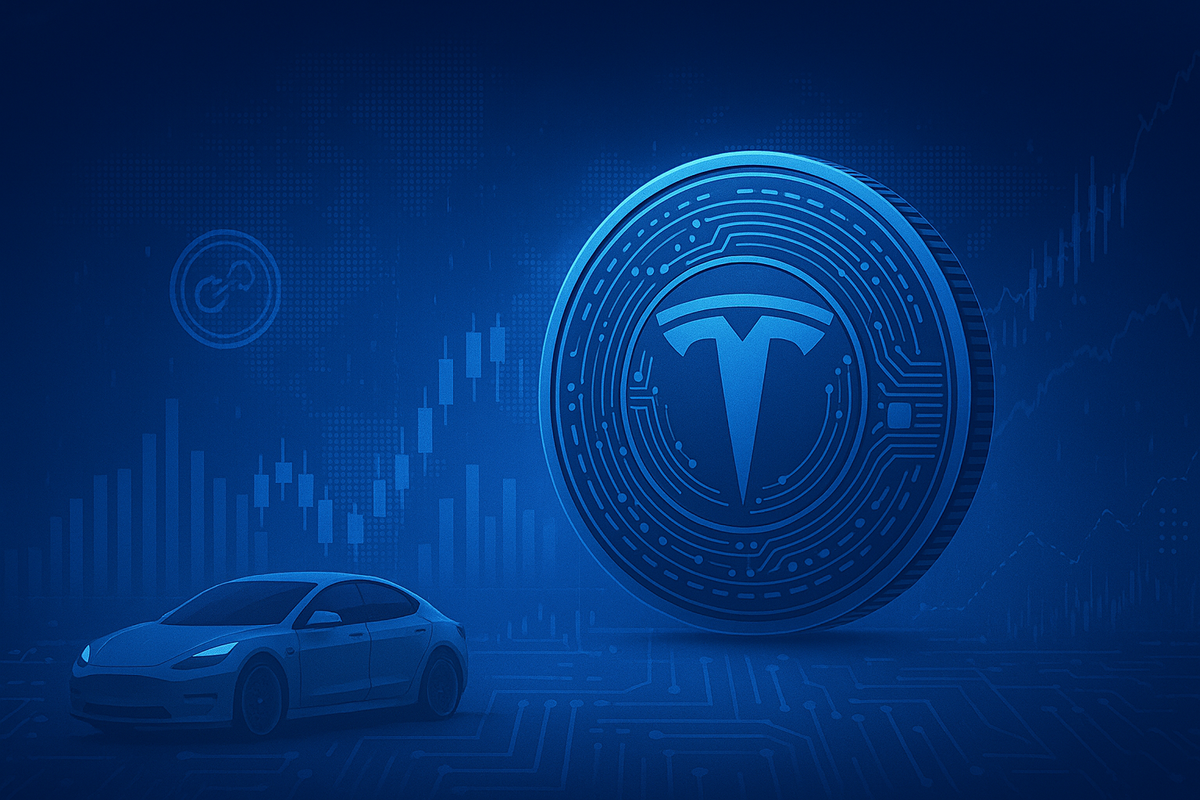Tesla Coupon Token (TCT): A Blueprint for Corporate Tokenization and The Death and Burial of Naked Shorting!

We believe structural changes under new U.S. policies are setting the stage for the next leg of one of the greatest bull markets in history. The Clarity Act, the new FASB accounting rules effective in 2025, and the introduction of a 2.5% in-kind trade tax are catalysts that accelerate the convergence of equity and crypto markets. Tokenization is no longer a fringe idea—it is becoming a central force in reshaping corporate finance, capital markets, and shareholder value.
Tesla serves as a compelling theoretical example of how these changes could play out. The Tesla Coupon Token (TCT) illustrates how a global consumer company could use tokenization to reward shareholders, deepen customer engagement, and strengthen its balance sheet. While Tesla is the case study here, this framework could be applied across industries, signaling how major corporations may fuel the broader bull market through token-driven ecosystems.
How the Tesla Coupon Token Works
Under this model, Tesla would issue a dividend of one TCT per outstanding share every six months. Each token has a six-month lifespan and carries a 10% discount on Tesla products, from vehicles to solar panels and energy solutions. For a car with an average selling price of $66,000, this equates to a coupon worth up to $6,600.
What makes the design unique is that tokens are not permanent liabilities. If redeemed, they are burned or recycled back into Tesla’s treasury. If they expire unused, they revert automatically to Tesla’s reserve pool. This ensures that value continually cycles back to the company, allowing perpetual re-issuance without runaway obligations.
A second utility makes the token structure even more powerful. Shareholders who receive the initial dividend gain the right to purchase future coupon tokens at a 20% discount to prevailing market prices. By tying long-term value to token acquisition rather than perpetual product discounts, Tesla creates an ongoing source of liquidity and shareholder alignment.
The Impact on Short Sellers and Market Dynamics
This framework has explosive implications for market dynamics. Every Tesla share would be linked not only to equity but also to a semiannual dividend token with real intrinsic value. Short sellers would be forced to deliver both the stock and the coupon. If clearing firms refuse to bear the risk of delivering a token that could be worth $6,600, naked shorts would face immediate forced buy-ins.
With Tesla’s free float around 900 million shares, even a 25% naked short position would require hundreds of millions of shares to be repurchased in a compressed timeframe. The resulting scramble could trigger one of the largest squeezes in history, pushing Tesla’s stock into the thousands per share. In effect, the token system raises the intrinsic floor of Tesla’s equity and amplifies reflexivity in price discovery.
Token Recycling and Long-Term Value Creation
The six-month expiration cycle is not a limitation but a feature that ensures sustainability. Tokens that expire unused or are redeemed recycle back into Tesla’s treasury, ready for reallocation or resale. This closed-loop design allows Tesla to continuously monetize its token supply without creating permanent liabilities.
Shareholders benefit through regular dividends, while Tesla captures liquidity by selling tokens from its reserve. Customers gain access to consistent discounts, creating an ecosystem where incentives for investors, the company, and buyers all remain aligned over time.
Driving Vehicle Sales and FSD Adoption
The most immediate effect of the TCT would be a surge in Tesla sales. The initial 10% coupon is a powerful incentive to bring in new buyers. But more importantly, anyone redeeming the first discount secures permanent access to future token rights at favorable prices, creating behavioral lock-in.
While per-vehicle margins compress under the 10% discount, Tesla can more than offset this through volume growth and adoption of high-margin software. Full Self-Driving (FSD) software, priced at $8,000 annually, becomes a natural add-on for buyers locked into Tesla’s ecosystem. In practice, Tesla trades a portion of its automotive margin for recurring, high-margin software revenues that expand profitability over the long term.
Regulatory and Accounting Tailwinds
Two policy shifts provide the foundation for making this model viable. First, the Clarity Act assigns tokens like TCT to the Commodity Futures Trading Commission (CFTC), removing the registration burdens that would have applied had the SEC classified them as securities. This clarity gives corporations room to innovate with tokenized structures.
Second, the new FASB rules effective in January 2025 allow companies to carry tokens at fair market value as cash equivalents. For Tesla, 15 billion tokens at $6,600 each equate to a $99 trillion balance-sheet asset. That kind of scale is theoretical, but the rules now permit tokens to be treated as cash-like holdings that strengthen equity and liquidity. Though marked-to-market volatility exists, the accounting shift makes tokens an additive force on shareholder equity and reported earnings.
Additional Revenue from the In-Kind Trade Tax
Another tailwind is the 2.5% in-kind trade tax. Every time a TCT changes hands in the secondary market, Tesla earns revenue. This feature turns trading activity itself into a profit engine for the company. The more liquid and widely adopted the token becomes, the more Tesla benefits, tying corporate earnings directly to ecosystem growth.
A Blueprint for Corporate Tokenization
The Tesla Coupon Token offers a blueprint for corporate tokenization at large. Any consumer-facing company could use a similar structure to link shareholder rewards, customer discounts, and digital finance under one architecture. Retailers, subscription services, automakers, and even industrial firms could adopt parallel frameworks, creating ecosystems that perpetually recycle value while rewarding both customers and investors.
Tokenization as the Engine of the Bull Market
Tesla’s TCT framework illustrates how tokenization could fundamentally reshape corporate finance. By aligning dividends, product discounts, and token markets, Tesla would simultaneously reward shareholders, drive sales, and build a stronger balance sheet. The system recycles value, creates perpetual liquidity, and ties financial engineering directly to customer adoption.
Furthermore, it will expose any traders who have outsized naked shorts. Anyone who is naked short will have to buy the token or the stock. Either way, the days of costless naked shorting are over, dead and buried.
More broadly, this is not just about Tesla. It is about the dawn of tokenized corporate finance as a structural driver of equity value. With supportive regulatory and accounting changes now in place, the fusion of crypto and equity markets is becoming a defining feature of the next market cycle. We believe tokenization will play a central role in powering the next leg of the greatest bull market in history.





